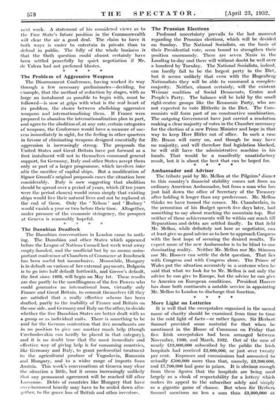The Danubian Deadlock
The Danubian conversations in London came to 'loth- Mg. The Danubian and other States which appeared before the League of Nations Council last week went away empty-handed, and the unofficial but by no means unim- portant conference of Chambers of Commerce at Innsbruck has been useful but inconclusive. Meanwhile, Hungary is in default on various of her external payments, Bulgaria is to go into half default forthwith, and Greece's default, the first since 1893, will begin on May 1st. These results are due partly to the unwillingness of the few Powers who could. guarantee an international loan, virtually only France and Great Britain, to commit themselves till they are satisfied that a really effective scheme has been drafted, partly to the inability of France and Britain on the one side, and Germany and Italy on the other, to decide whether the five Danubian States are better dealt with as a group or as individual units. There is something to be said for the German contention that five mendicants arc in no position to give one another much help (though Czechoslovakia can hardly be placed in that category), and it is no doubt true that the most immediate and effective way of giving help is foi consuming countries, like Germany and Italy, to grant preferential treatment to the agricultural produce of Yugoslavia, Rumania and Hungary, and to a wider range of imports from Austria. This week's conversations at Geneva may clear the situation a little, but it seems increasingly unlikely that any permanent agreement will be reached till after Lausanne. Debts of countries like Hungary that have over-borrowed heavily may have to be scaled down alto- gether, to the grave loss of British and other investors.






































 Previous page
Previous page